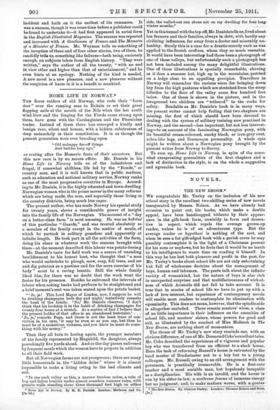HOME LIFE IN NORWAY.*
THE fierce raiders of old Norway, who rode their " foam deer" over the running seas to Britain or set their great flapping sails at the mouth of the Nile when the hot south wind blew and the lOnging for the Fiords came strong upon them, have gone with the Carthaginian and the Phoenician
trader. Instead of them there has emerged a kindly and benign race, silent and honest, with a hidden substratum of deep melancholy in their constitution. It is as though the present generation were ever brooding upon "Old unhappy far-off things And battles long ago," or resting after the Homeric feats of their ancestors. But this new race is by no means effete. Mr. Daniels in his Home Life in Norway tells us of the industrious and frugal, if somewhat shiftless, life led by the "Bonde," or country man, and it is well known that in public matters, such as education and national military service, Norway ranks as one of the most progressive countries in Europe. Accord- ing to Mr. Daniels, it is the highly educated and town-dwelling Norwegian woman who is the prime mover in-the many reforms which are being made, the men, and especially those living in the country districts, being much less eager.
The present author, who has made Norway his special study fOr twenty years, shows a considerable power of insight into the family life of the Norwegian. The account of a " day on a better-class farm " is most amusing. He was an habitue of this particular " Gaarde," and was treated absolutely as a member of the family except in the matter of meals, of which he partook in solitary grandeur and apparently at infinite length. He took part in all the activities of the farm, doing his share in whatever work the seasons brought with them—at the moment described this labour was potato-hoeing
Mr. Daniels's taste for field work was a source of unending bewilderment to his honest hose, who thought that " a man who would undertake to plough, mow, reap, fell trees, and set and dig potatoes as a pastime and for-the mere exercise of his body " must be a raving lunatic. Still the whole family liked him, for there was no doubt that the work went the faster for his presence. Besides he enlivened the intervals of labour when aching backs had perforce to be straightened and a brief moment's rest was taken seated upon the potato basket.
"
'Ja, ja! This Lord Mayor of London, now, I suppose he will be drinking champagne both day and -night,' tentatively remarks
the head of the family. 'No,' Mr. Daniels observes, don't think that his lordship is in the habit of drinking champagne for twenty-four hours at a stretch. As a matter of fact I believe that the present holder of that office is an abandoned teetotaler.' . . . Ja, ja,' remarks Papa, and there is not the least trace of con- viction in his eyes, 'it may be even so as you say, but then he must be of a monstrous richness, and you know he must do some- thing with his money."
Then they all turn to hoeing again, the younger members of the family represented by Magnhild, the daughter, always provokingly five yards ahead. And so the day passes enlivened by frequent meals which the women have to prepare in addition to all their field work.
But all Norwegian farms are not prosperous; there are many little homesteads in the " hidden dales" where it is almost impossible to make a living owing to the bad climate and soil.
"In one such valley as this, a narrow treeless canon, a ruin of bog and fallen boulder under almost ceaseless summer rains, with granite walls standing sheer three thousand feet high on either • Home Life 'in Noncay. By H. K. Daniels. London Methuen and Co. Us. ed.]
side, the walled-out sun shone not on my dwelling for four long winter months."
Yet in this tunnel with the-top off, Mr. Daniels tells us, lived about ten farmers and their families, always in debt, with hardly any civilizing influences, far away from a doctor and miserably un- healthy. Surely this is a case for a drastic-remedy such as was applied to the Scotch crofters, whom they so much resemble. It would have been interesting had there-been a photograph of one of these valleys, but unfortunately such a photograph has not been included among the many delightful illustrations. One of these illustrations is specially remarkable, showing as it does a summer hut, high up in the mountains, perched on a ledge close to an appalling precipice. Travellers in Norway will remember the curious wires for bringing down hay from the high pastures which are stretched from the steep hillsides to the floor of the valley some five hundred feet below. One of these is shown in the picture, and in the foreground two children are "tethered" to the rocks for safety; Reada,ble as Mr. Daniels's book is in many ways, the present writer cannot help feeling that two.chapters are missing, the first of which shpuld have been. devoted to dealing with the system of military training now practised in Norway, and the second—less important, but not less interest- ing—to an account of the fascinating Norwegian pony, with its beautiful cream-coloured, smoky black, or iron-grey coat, zebra-like legs, and Ibsenesque. personality. A whole. epio might be written about a Norwegian pony brought by the present writer from Norway to Surrey.
To sum up, Home Life in Norway, in spite of the some- what exasperating generalities of the first chapters and- a lack of distinction in the style, is on the whole a suggestive and agreeable book.


















































 Previous page
Previous page